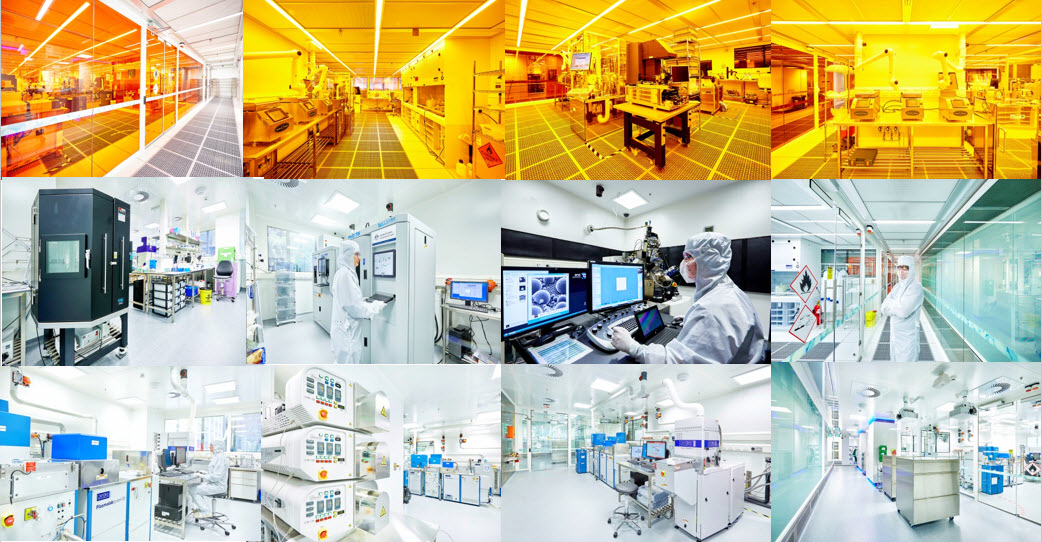
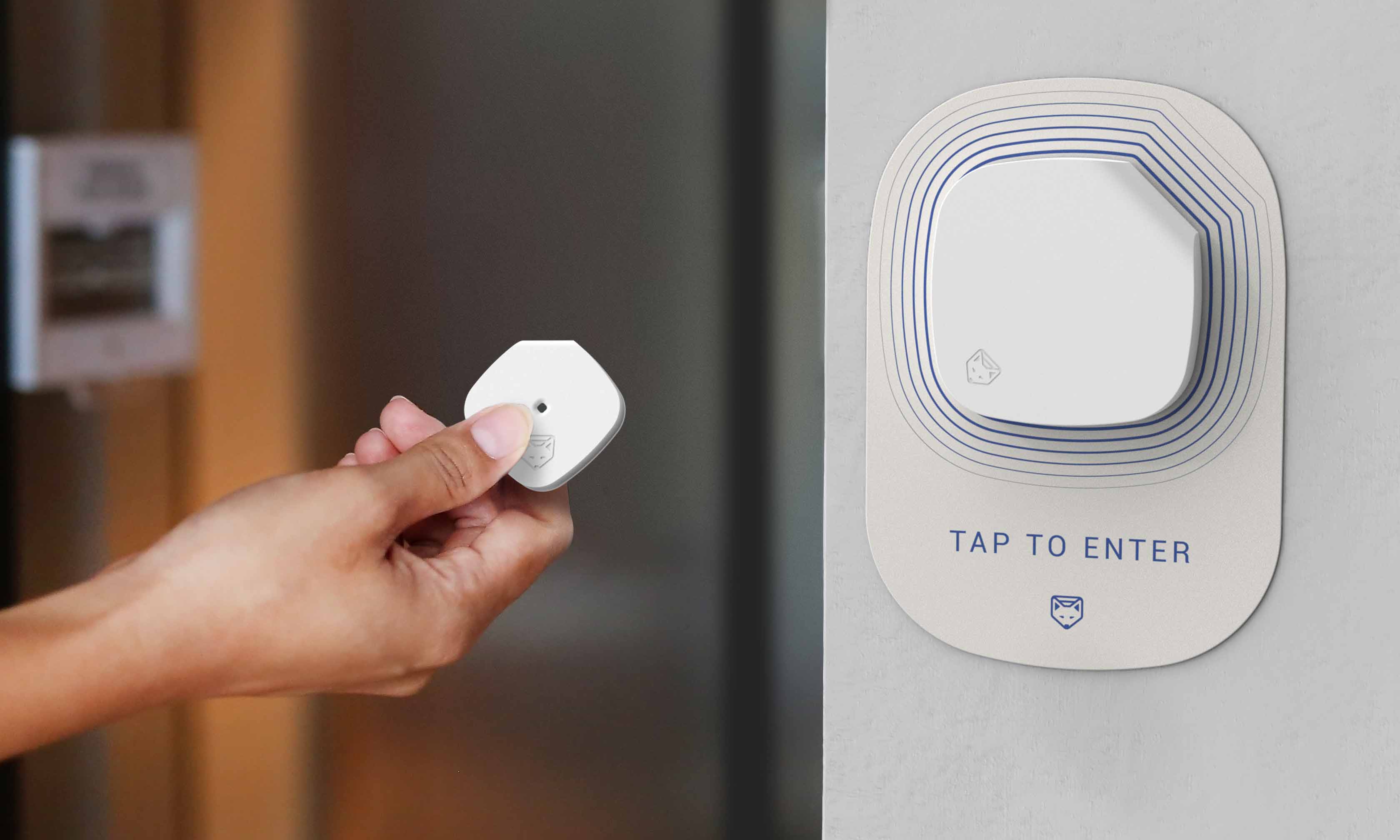
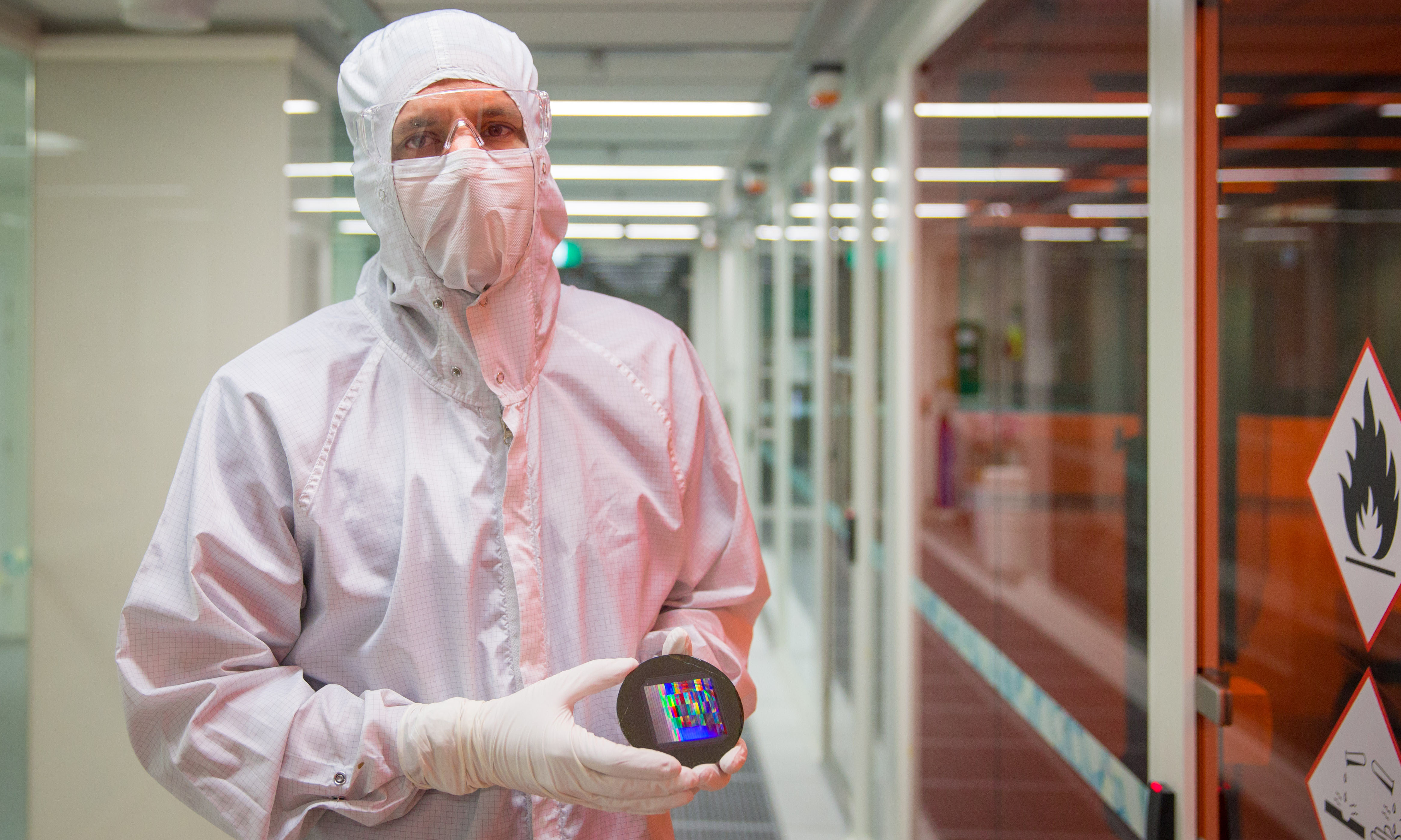
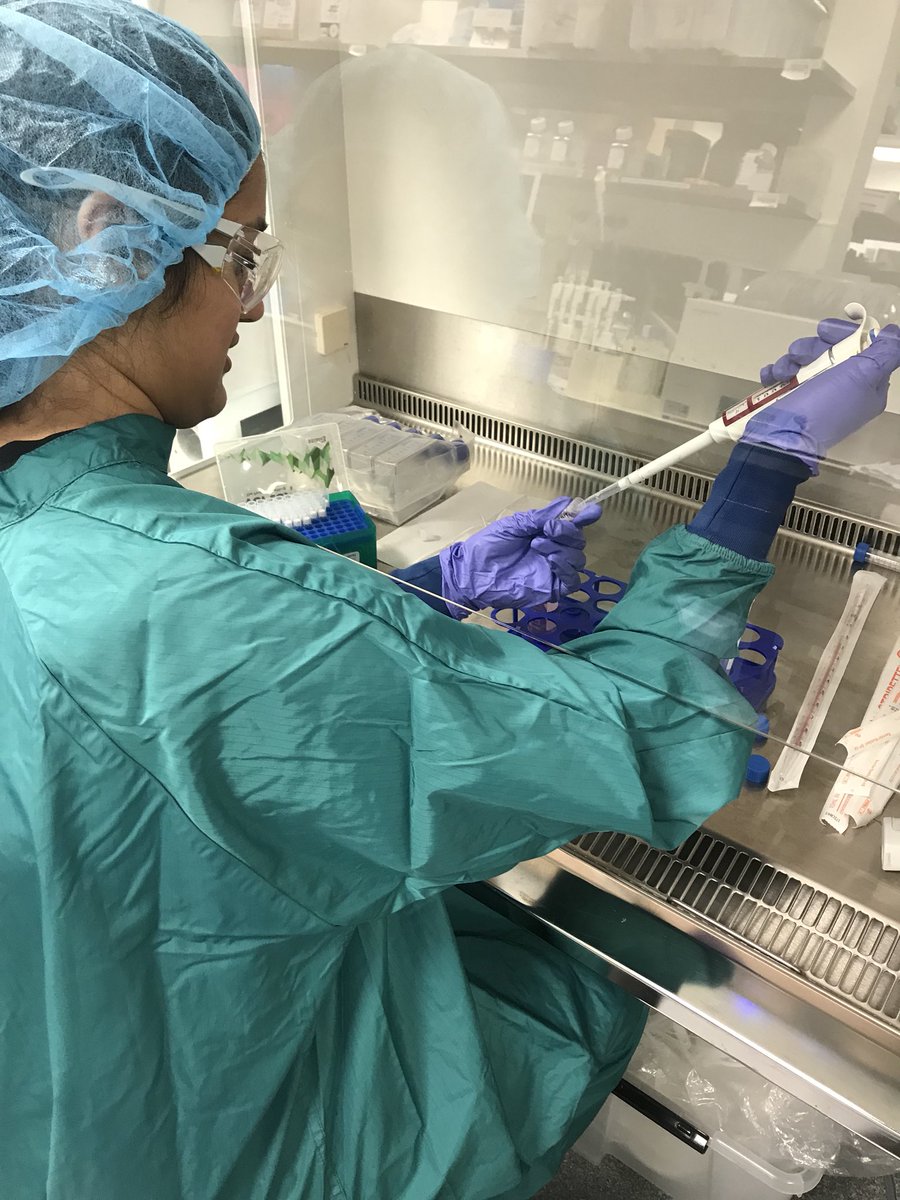

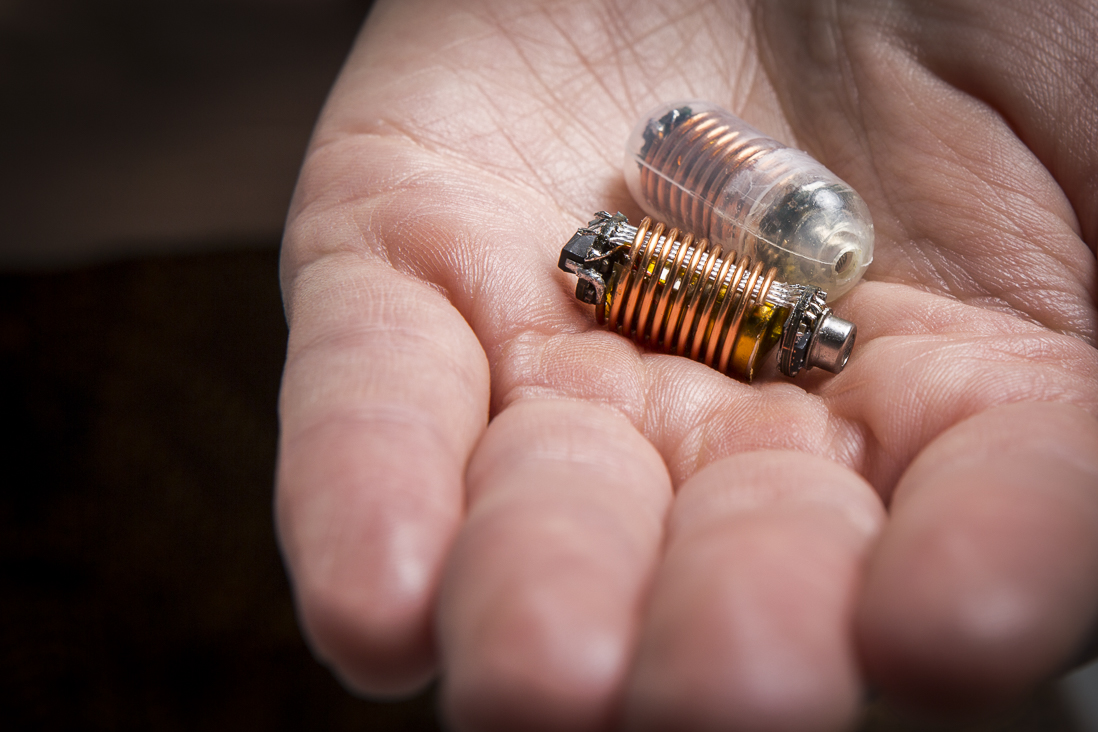
MNRF Vision:
The MNRF aims to foster a robust research culture that encompasses all aspects of micro/nano-scale research, including discovery, education, communication, and translation to real-world applications. By promoting a comprehensive understanding of micro/nanoscale materials, devices, and integrated systems, the MNRF strives to make significant contributions to scientific knowledge and practical advancements.
MNRF Mission:
-
Support Research and Training: The MNRF is dedicated to supporting world-leading research and training in the field of micro/nanoscale materials, devices, and integrated systems. It achieves this by providing excellent and accessible capabilities, which are underpinned by state-of-the-art equipment and infrastructure. The MNRF ensures that researchers have access to the necessary tools and resources to conduct cutting-edge research and receive comprehensive training in their respective fields.
-
Foster Diversity and Inclusion: The MNRF recognizes the importance of diversity in discipline, gender, ethnicity, and career stage. It actively promotes and nurtures diversity, considering it as a strength that can contribute to achieving its vision. By creating an inclusive environment, the MNRF aims to harness the diverse perspectives and experiences of individuals from various backgrounds to drive innovation and excellence in micro/nano-scale research.
-
Engage with Stakeholders: The MNRF acknowledges the significance of engaging with stakeholders from different sectors. It actively collaborates with academia, university leadership, industry, government, and the general public to foster meaningful partnerships and collaborations. By involving stakeholders from various domains, the MNRF ensures that its research efforts align with the needs and priorities of the broader society, facilitating the translation of research outcomes into practical applications.
In summary, the MNRF's vision is to cultivate a research culture that encompasses all aspects of micro/nano-scale research, while its mission focuses on supporting research and training, fostering diversity and inclusion, and engaging with stakeholders to achieve its vision and maximize the real-world impact of micro/nanoscale research.
IMPORTANT
For further information about the MNRF please visit the MNRF Sharepoint Site
You will also find on this site other relevant documentation and information regarding the MNRF
How to access the MNRF?
To gain access you are required to do all the following general processes before commencing work at the MNRF. Please read all steps before proceeding.
- Complete this form in the link to register for the general MNRF induction. We will send you a calendar invite once a spot is available for you
- (Reminder) Please register in the ilab booking system (click here). Note that your supervisor must also be registered as a primary investigator (PI)
- (Reminder) Complete the MNRF ilab first-time user form and upload all the bellow certificates (click here). See the attached manual for full details
RMIT online safety modules (please keep a copy of these certificates as you will need to upload them into our booking system when you complete the iLab first-time user registration in due time!).
The online modules can be found at:
https://rmit-catalog.rmit.edu.au/browse/catalog/stem/inductions
- STEM College: General Facility Safety Induction
- Physical Containment Safety Induction
- Only for PC2 lab users {if you are to use the PC2 lab at MNRF it is also compulsory to get through the PC2 local induction by completing this MS form (click here)
- Biological Safety Induction
- Chemical Safety Induction
- Nanomaterial’s Safety Induction
- Cryogenic Handling Safety Induction
- Laser safety
- Electrical safety
- Cleanroom Protocols Safety Induction
- Manual Handling
- After-hours access module certificate
- Pressurised Gases Safety Induction
- Lithium Polymer Battery Safety Induction
- Upload all the above certificates into MNRF iLab first-time user (click here) see the attached manual for full details
- Attend general MNRF induction
Please note, that all after-hours access can be approved only when you have completed and passed all assessments and training, also, you have to complete the activity risk assessments (ARA) for working in isolation approved and signed by your supervisor.
Note 1: Access will be only granted by the MNRF manager or manager’s representative following the completion of all the above (you will be invited to a local induction session by MNRF staff).
Note 2: Users initially can only be in the facility during the standard office hours 9:00 am - 5:00 pm. You will be granted Expert, After Hours (6 am - 11 pm / 7 days) following the successful fulfilment of a training assessment on a piece of equipment or a process at MNRF.
Note 3: Please remember to acknowledge MNRF in your publications. The preferred statement to use is:
"This work was performed in part at the RMIT Micro Nano Research Facility (MNRF) in the Victorian Node of the Australian National Fabrication Facility (ANFF)”
Please take a moment and give us your feedback by clicking here to help us improve your MNRF experience.
Regards
MNRF Team
MNRF Leadership and Staff:
Location and Hours of Operation
| Hours |
Location |
|
9:00 am - 5:00 pm University Business Days
|
MNRF Main Office, Building 7 South, Level 4, Room 10,
Bowen St, Melbourne, Vic, 3000
|
Available Equipment and Resources
|
▼
►
007.04.001 Wet Etch Lab ISO5/C100 (13)
|
| Name |
Price |
|
Aqua Regia Processing FC 4.2 Left (741)
|
|
|
Aqua Regia Processing FC 4.2 Right (741)
|
|
|
Base KOH processing FC 4.4 (741)
|
|
|
Base Processing - DLFC 4.3 Right - Lab Systems (741)
|
|
|
Chromium Etching FC 4.2 Left Side (741)
|
|
|
Chromium Etching FC 4.2 Right Side (741)
|
|
|
Cyanide Processing - DLFC 4.3 Left - Lab Systems (741)
|
|
|
General Acid Processing FC 4.2 Right (741)
|
|
|
HF Processing - DLFC 4.5 - Lab Systems (741)
|
|
|
Piranha Processing FC 4.1 (741)
|
|
|
RCA 1 - Organic Residue Removal FC 4.3 Right (741)
|
|
|
RCA 2 - Ionic Residue Removal FC 4.2 Right (741)
|
|
|
Tetra-methyl-ammonium Hydroxide Etching FC 4.4 (741)
|
|
|
|
▼
►
007.04.003 PDMS Lab ISO5/C100 (12)
|
| Name |
Price |
|
Fume Hood FC-4.6 Left (743)
|
|
|
Fume Hood FC-4.6 Right (743)
|
|
|
Glovebox LC200 & SCS Spincoater/vacuum oven - Right- (743)
|
|
|
Glovebox LC200 - LC - Left - (743)
|
|
|
PDMS spin coater - Laurell 650M (743)
|
|
|
Planetary Vacuum (Thinky) Mixer - (743)
|
|
|
Plasma Cleaner - PDC-002 - Harrick Plasma - (743)
|
|
|
Polymer spin coater - 650M - Laurell- (743)
|
|
|
Preparation area - Desk (743)
|
|
|
Preparation area - Desk 2- (743)
|
|
|
Vacuum Oven - Thermo Scientific-1 - (743)
|
|
|
Vacuum Oven - Thermo Scientific-2- (743)
|
|
|
|
▼
►
007.04.005 Photolithography Lab ISO5/C100 (23)
|
| Name |
Price |
|
Multi-Photon Direct Laser Lithography - GT+ Nanoscribe (745)
|
|
|
Fume Hood FC4.7 Left (All resists and Lift-off processing) - (745)
|
|
|
Fume Hood FC4.7 Right (Only EBL Resists processing) - (745)
|
|
|
HP 1,2,3 (SU8 and Misc Processing) - (745)
|
|
|
HPL.1,2,3 - Hotplate (AZ Processing ONLY) - (745)
|
|
|
Laurell spinner 650M - EBL resists only - (745)
|
|
|
Laurell spinner WS-650 - Wafer Dryer - (745)
|
|
|
Mask aligner / BS alignement - MA6 - Karl SUSS - (745)
|
|
|
Mask Aligner / NIL / BS Alignment - EVG 610 - EVG (745)
|
|
|
Optical Microscope - Nikon LV150N
|
|
|
2D Material transfer tool for heterostructure assembly - (745)
|
|
|
Plasma Cleaner - Harrick Plasma - (745)
|
|
|
Spin/Spray coating system - EVG101 - EVG - (745)
|
|
|
Thin-Film Analyzer-F40-Filmetrics - (745)
|
|
|
Ultrasonicator Bath - XUB18 - Grant - (745)
|
|
|
UV Flood Source - 2000-PC - Dymax - (745)
|
|
|
Micro Transfer Printing - MTP1002 - xDisplay - (745)
|
|
|
Vapor Prime ovens - YES LP-IIIa - Sitek - (745)
|
|
|
Wafer bonder - SB6 - SUSS Microtech - (745)
|
|
|
Zeiss Objective 10x NA0.3 for rapid prototyping on Nanoscribe (745)
|
|
|
Zeiss Objective 20x NA0.5 for 2D maskless lithography on Nanoscribe (745)
|
|
|
Zeiss Objective 25x NA0.8 for mesoscale structures on Nanoscribe (745)
|
|
|
Zeiss Objective 63x NA1.4 for high-resolution structures on Nanoscribe (745)
|
|
|
|
▼
►
007.04.007 Novel Fabrication Lab ISO5/C100 (2)
|
| Name |
Price |
|
EBL - Voyager - Raith (747)
|
|
|
PC - GenIsys package (Beamer, Tracer, ProSEM) and Nanosuite (offine/training) package (747)
|
|
|
|
▼
►
007.04.011 Support Lab (6)
|
| Name |
Price |
|
Benchtop UV Transilluminator - UVP (7411)
|
|
|
Dicing Saw-DISCO DAD 321-NanoFab (7411)
|
|
|
Micro centrifuge- Labogene 1524M-ScanSpeed (7411)
|
|
|
Micro milling machine – CPM 4030 – Isel (7411)
|
|
|
Polishing machine-PM5-Logitech (7411)
|
|
|
UV Flood Curing - Sunray 400 SM (7411)
|
|
|
|
▼
►
007.04.012 Sensors Lab (7)
|
| Name |
Price |
|
Glove box-KK-011AS _ Kiyon (7412)
|
|
|
Small single Glove box (7412)
|
|
|
High speed CENTRIFUGE (non refrigerated) FRONTIER™ MULTI - OHAUS (7412)
|
View calendar
|
|
Fumehood FC-4.9 Granite table (7412)
|
|
|
Fumehood FC-4.10 (7412)
|
|
|
Fumehood FC-4.11 & Gas sensing N2/Air platform (7412)
|
|
|
Fumehood FC-4.12 only (No gas sensing platform) (7412)
|
|
|
|
▼
►
007.04.013 PC2 Lab (35)
|
| Name |
Price |
|
(PC2) Class 2 Biohazard Safety Cabinets 1 (Right side) - Mars - LABOGENE (7413)
|
|
|
(PC2) Class 2 Biohazard Safety Cabinets 2 (Left Side) - Mars - LABOGENE (7413)
|
|
|
(PC2) Zeta Potential - Zetasizer - Nano ZS (7413)
|
|
|
(PC2) Bio - MFP3D - Asylum Research Atomic Force Microscope (AFM) (7413)
|
|
|
(PC2) Refrigerated Centrifuge - 5810R - Eppendorf (7413)
|
View calendar
|
|
(PC2) Flow Cytometer - Accuri - BD Biosciences (7413)
|
|
|
(PC2) Countess™ Automated Cell Counter - Invitrogen (7413)
|
|
|
(PC2) TC20 Automated Cell Counter - Bio Rad (7413)
|
|
|
(PC2) Confocal Microscope - Nikon Ti-E (7413)
|
|
|
(PC2) Plate Reader - SpectraMax Paradigm - Molecular Device (7413)
|
|
|
(PC2)v Inverted Fluorescent Cell Imager Microscope - Zoe - BioRad (7413)
|
|
|
(PC2) Electrophoresis GEL Reader-BioRad XR+ (7413)
|
|
|
(PC2) ELISA Plate Washer - ImmunoWash 1575 - BioRad (7413)
|
|
|
(PC2) Dry 2 Blocks Digital Heater - RATEK (7413)
|
|
|
(PC2) Hot Plate and Stirrer - Stuart UC152 (1,2) (7413)
|
|
|
(PC2) Inverted Routine Microscope - Nikon Eclipse TS100 (7413)
|
|
|
(PC2) Micro Centrifuge - Pico 17 - HERAEUS (7413)
|
|
|
(PC2) Micro Volume Spectrophotometer - MaestroNano (MaestroGen) (7413)
|
|
|
(PC2) Orbital Shaker - Ratek - EOM5 (7413)
|
|
|
(PC2) Oven - Drying and Heating - Binder ED-23 (7413)
|
|
|
(PC2) PC2 DNA, RNA and Protein Working Benches (7413)
|
|
|
(PC2) Real Time PCR - CFX96 - BioRad (7413)
|
|
|
(PC2) PCR Thermal Cycler - T-100 - BioRad (7413)
|
|
|
(PC2) PH Meter - Bench - Top Meter - Sper Scientific (7413)
|
|
|
(PC2) Probe Sonicator - SFX550 - Branson (7413)
|
|
|
(PC2) Protein and/or DNA Electrophoresis Chamber Tank and Power Supply Apparatus (7413)
|
|
|
(PC2) Steam Sterilizer - Autoclave SX-700E-TOMY SIEKO (7413)
|
|
|
(PC2) Tube Revolver - Thermo Scientific (7413)
|
|
|
(PC2) Ultra Centrifuge - V100X-VWR (7413)
|
|
|
(PC2) Ultrasonicator Bath - YH5412 (7413)
|
|
|
(PC2) Ultrasonicator Bath - XUB18 - Grant (7413)
|
|
|
(PC2) Upright Fluorescence Microscope - Eclipse Ci - Nikon (7413)
|
|
|
(PC2) UV/Ozone Cleaner - Pro Cleaner - BioForce Nanoscience (7413)
|
|
|
(PC2) Water Bath (7413)
|
|
|
(PC2) Digital Shaking Water Bath - SWB20D - Ratek (7413)
|
|
|
|
▼
►
007.04.016 Physical Vapour Deposition Lab (PVD) (19)
|
| Name |
Price |
|
650°C Vacuum Furnace - VBF - 1200X - MTI Corporation (7416)
|
|
|
Deep Silicon Etching - PlasmaPro 100 Estrelas - (BRE) Oxford (7416)
|
|
|
E-beam Evaporator Deposition - eKLipseTM - Kurt J. Lesker (7416)
|
|
|
FB1.1 - LPCVD - CTR125 - Expertech (7416)
|
|
|
FB1.1 - Titanium in diffusion of LiNbO3 -Development - CTR125 - Expertech (7416)
|
|
|
FB1.2 - Solid Source Boron Doping Furnace- CTR125 - Expertech (7416)
|
|
|
FB1.2- Titanium in Diffusion of LiNbO3 Production - CTR125 - Expertech (7416)
|
|
|
FB1.3 - Silicon Wet/Dry Thermal Oxidation Furnace - CTR125 - Expertech (7416)
|
|
|
FB1.3 - Sintering in Forming Gas Furnace - CTR125 - Expertech (7416)
|
|
|
Magnetron Sputtering - PVD 75 - Kurt J. Lesker (7416)
|
|
|
PlasmaPro (Cl) System100 Cluster - ICP - Oxford - Chloride (7416)
|
|
|
PlasmaPro (Fl) System100 Cluster - ICP - Oxfrod - Fluoride (7416)
|
|
|
PlasmaPro System100 Cluster - ALD - Al2O3 - Oxford (7416)
|
|
|
PlasmaPro System100 Cluster - ALD - Hf - Oxford (7416)
|
|
|
PlasmaPro System100 Cluster - ALD - Ti - Oxford (7416)
|
|
|
PlasmaPro System100 Cluster - ALD - ZnO - Oxford (7416)
|
|
|
PlasmaPro System100 Cluster - PECVD - Oxford (7416)
|
|
|
PlasmaPro System100 Cluster - PECVD - Oxford - SiD4 (7416)
|
|
|
Thermal Evaporation - K975X - Quorum Technologies (7416)
|
|
|
|
▼
►
007.04.018 Metrology Lab ISO7/C10000 (10)
|
| Name |
Price |
|
3D Optical Profiler - ContourGT - Bruker (7418)
|
|
|
Atomic Force Microscope (AFM) - Dimension Icon-Bruker (7418)
|
|
|
Laser Doppler Vibrometer - MSA 500- Polytec (7418)
|
|
|
Laser Doppler Vibrometer - UHF 120 - Polytec (7418)
|
|
|
Microspectrophometer - CRAIC Apollo - CRAIC Tech (7418)
|
|
|
Spectroscopic Ellipsometer- M- 2000Â Woollam (7418)
|
|
|
Stylus Profilometer - Dektak XT - Bruker (7418)
|
|
|
Upright Microscope - BX41 LED - Olympus (7418)
|
|
|
X-ray Diffractometer - D2 Phaser-Bruker (7418)
|
|
|
Zeiss Orion NanoFab : Helium, Neon & Gallium FIB (7418A)
|
|
|
|
▼
►
012.07.024 Miniaturised Functional Devices Lab (1)
|
| Name |
Price |
|
Work Benches (12724)
|
|
|
|
▼
►
012.09.012 Wave - Matter Interaction Lab (2)
|
| Name |
Price |
|
Cypher ES AFM - 12.09.12 (12912)
|
|
|
neaSCOPE Nanoscale Imaging & Spectroscopy (12.09.12)
|
|
|
|
▼
►
012.09.012A Micro-Raman and Photoluminescence Lab (2)
|
| Name |
Price |
|
Fume Cupboard FC12a (12.09.12a)
|
|
|
Raman/PL - HORIBA LabRAM HR Evolution (12912a)
|
|
|
|
▼
►
012.09.012B Tetrahertz Spectroscopy Lab (2)
|
| Name |
Price |
|
Fume Cupboard FC12B (12.09.12b)
|
|
|
Terahertz Time Domain Spectroscopy (12912b)
|
|
|
|
▼
►
012.09.018 Patterning ISO6/C1000 (7)
|
| Name |
Price |
|
12.09.18 - Teaching class - All instruments (12918)
|
|
|
Fume Cupboards (12918)
|
|
|
HPC-HARRICK Plasma Cleaner (12918)
|
|
|
OAI 1, 2 Model 200 - Mask Aligner (12918)
|
|
|
Olympus MX63 Semiconductor/FPD/Industrial Inspection Microscopes (12918)
|
|
|
THP 1, 2, 3, 4 - SPS POLOS Hotplates (12918)
|
|
|
TSC1, 2, 3, 4 - SPIN150-Wafer Spinners (12918)
|
|
|
|
▼
►
012.09.019 Deposition ISO6/C1000 (8)
|
| Name |
Price |
|
012.09.019 - Teaching Class - ALL Instruments (12919)
|
|
|
CVD - Three Zone Tube Furnace (12919)
|
|
|
E-beam Evaporator Deposition - PVD75-Kurt J. Lesker (12919)
|
|
|
Fume Hood (12919)
|
|
|
MLA150 Maskless Aligner - Heidelberg Instruments (12919)
|
|
|
RC8 Spinner (12919)
|
|
|
RIE 200W Reactive Ion Etcher (12919)
|
|
|
Sputter Coating System - PVD75 - Kurt J. Lesker (12919)
|
|
|
|
▼
►
012.09.023 LTCC Clean Room ISO6/C1000 (10)
|
| Name |
Price |
|
12923 - ST06002 Stacker System - PTC
|
|
|
Ceramic Cutter - CT08003 - PTC (12923)
|
|
|
CeraPrinter – Digital Materials Deposition Platform (12923)
|
|
|
Circuit CAM 7 Laser Plus (12923)
|
|
|
DCT Laser Micromachining (12923)
|
|
|
Isostatic Laminator - LT Series - PTC (12923)
|
|
|
LTCC Fume Hood 1 (12923)
|
|
|
Planetary Vacuum (Thinky) Mixer - (12923)
|
|
|
RT06001 Ceramic Printer - PTC (12923)
|
|
|
Tape Caster - AT06001- PTC (12923)
|
|
|
|
▼
►
012.09.026 LTCC Materials Preparation Lab (10)
|
| Name |
Price |
|
Across Intl Lab Oven (12926)
|
|
|
Ball Mill - PQ-N04 - Across International (12926)
|
|
|
Carbolite - LTCC Sintering Furnace (12926)
|
|
|
Centrifuge - 5702 - Eppendorf (12926)
|
|
|
LTCC Fume Hood 2 (12926)
|
|
|
LTCC Fume Hood 3 and Balances Platform (12926)
|
|
|
Micro Centrifuge - Labogene 1524M - ScanSpeed (12926)
|
|
|
Netzsch Lab Mill - NETZSCH - Feinmahltechnik GmbH (12926)
|
|
|
Parr Hydrothermal Reactor (12926)
|
|
|
Tube Furnace 1 Zone - STF1200 (12926)
|
|
|
|
▼
►
012.09.027 LTCC Materials Characterisation Lab (6)
|
| Name |
Price |
|
Autolab - Electrochemical Workstation (12927)
|
|
|
Compact 150W Solar Simulator - LCSS-150A - Zolix (12927)
|
|
|
Desktop Circuit Board Printer - Voltera V-One (12927)
|
|
|
Electrochemical Analyzer/Workstation (600C Series) (12927)
|
|
|
LTCC Fume hood 4 (12927)
|
|
|
NEWARE - Battery Testing System (12927)
|
|
|
|
▼
►
ZZZ test category (8)
|
| Name |
Price |
|
CNC Mini-Mill_GX - MINITECH (7411)
|
|
|
Drill Press - Dremel (7411)
|
|
|
Flip-chip Bonding - Finetech (7411)
|
|
|
Function Generator - Series 8200 - Tabor (7412)
|
|
|
Multimeter - 2001 - Keithley (7412)
|
|
|
SourceMeter - 2602 - Keithley (7412)
|
|
|
DC Power Source - PS2520G - Tektronix (7412)
|
|
|
(PC2) Nano - Plotter - GeSiM (7413)
|
|
|




